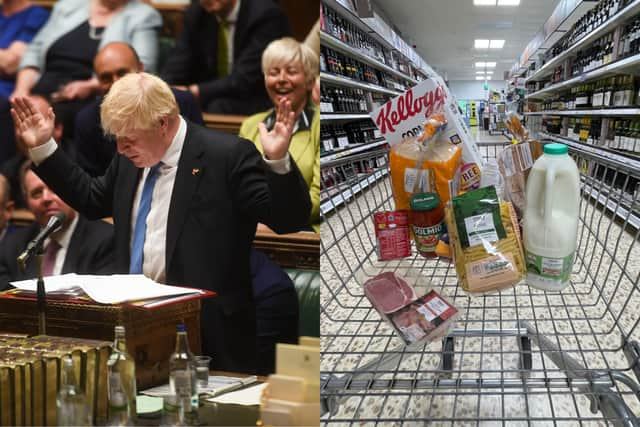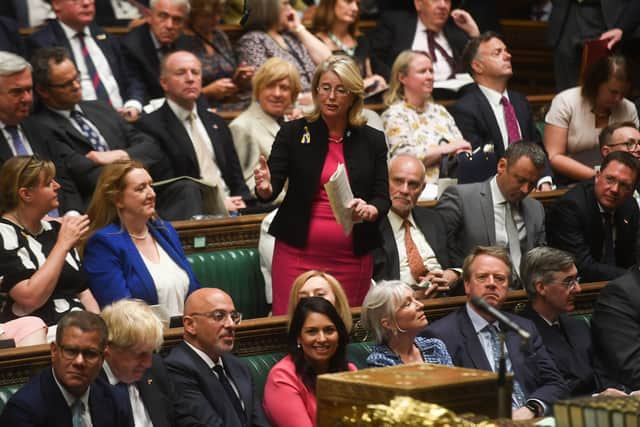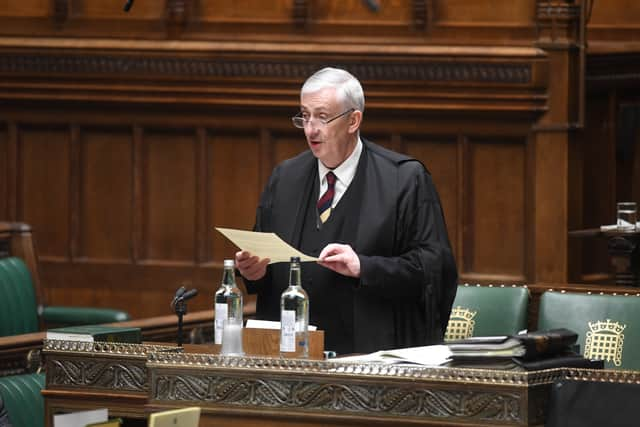When will Parliament resume? Dates of recess explained as Labour calls for MPs to return to work early
and live on Freeview channel 276
The UK Government is currently on summer ‘recess’ - which means that for a set period of time neither the House of Commons nor the House of Lords meets for business in Parliament.
This happens every year, but this summer in particular the Government has faced criticism for being ‘missing in action’ while the population struggles with skyrocketing energy bills.
Advertisement
Hide AdAdvertisement
Hide AdToday (19 August), the Labour Party has called for MPs to return to Parliament early to deal with the cost of living crisis.
Thangam Debbonaire, shadow leader of the House of Commons, has written to prime minister Boris Johnson asking him to recall Parliament on 22 August, saying that new policies are urgently needed before the energy bills rise in October.


Parliament can be recalled, but it would have to involve a major event of national importance - and the Government must pass its request to the Commons Speaker, currently Sir Lindsay Hoyle.
So when does Parliament resume, is it likely to be recalled, and are there any other recesses?
Here’s what you need to know.
When does Parliament resume?
Advertisement
Hide AdAdvertisement
Hide AdThe House of Commons adjourned on Thursday 21 July, and is due to resume on Monday 5 September - the same day either Rishi Sunak or Liz Truss is announced as the UK’s next Prime Minister.
Before this, Mr Johnson will at some point tender his formal resignation to the Queen, which will allow her to formally appoint his successor.
What is recess?
A recess is a break during the parliamentary session (year) in which neither the House of Commons or the House of Lords meets to conduct business.
According to the UK Parliament website, during a recess period, MPs and Lords “can carry out their other duties”.


Advertisement
Hide AdAdvertisement
Hide AdThe longest recess is in summer, but there are also breaks for Easter and Christmas, as well as short breaks in February and November.
Usually, the summer recess is a period where political news is particularly quiet - but this year’s Tory leadership contest means that MPs have still been making headlines.
Can Parliament be recalled?
There are circumstances in which Parliament can meet during recess, or in which MPs return to business earlier than usual, but it has to involve a ‘major event of national importance’.
The Government has to put the request to the Commons Speaker, currently Sir Lindsay Hoyle, who must then decide whether it is in the public interest to approve a recall.


Advertisement
Hide AdAdvertisement
Hide AdParliament was last recalled on 18 August 2021, to discuss the crisis in Afghanistan following the fall of Kabul to the Taliban.
Is it likely Parliament will be recalled?
There is no way of knowing what the Commons Speaker’s decision will be, but the Government has responded to criticism of the recess by saying it is already supporting people amidst the cost of living crisis.
A spokesperson said the Government was still focused on “delivering for the public” and would continue to provide financial support for households.
They added that new fiscal decisions would be for the next Prime Minister.
Advertisement
Hide AdAdvertisement
Hide AdBut Ms Debbonaire has said the country faces an “urgent choice” that must be made now.
In her letter to Mr Johnson, she wrote: "Across Britain, people are having to make unthinkable choices about how to pay their bills, causing endless worry for households and businesses.
"That is why I am writing to you today to urge you to bring Parliament back early on Monday 22 August so that we can freeze the energy price cap now ahead of winter.
"Families deserve a government that is on their side, and is ready to take the action needed now to meet the scale of this national emergency."


Advertisement
Hide AdAdvertisement
Hide AdTory leadership candidates Mr Sunak and Ms Truss have not indicated any plans to introduce a price cap freeze in their pitches thus far.
The Foreign Secretary has said she will tackle the cost of living crisis by cutting taxes. Namely, she plans to reverse the hike in National Insurance, suspend the green levy part of energy bills, and cancel a planned increase in corporation tax.
The former chancellor meanwhile has promised to reduce VAT on domestic energy bills from 5% to zero and to cut 3p off income tax by 2029.
He has also said he will offer more financial aid to households and increase cost of living payments by “a few hundred pounds” if he becomes the next Prime Minister.
Comment Guidelines
National World encourages reader discussion on our stories. User feedback, insights and back-and-forth exchanges add a rich layer of context to reporting. Please review our Community Guidelines before commenting.
